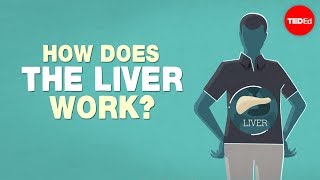(单词翻译:单击)
There's a factory inside you that weighs about 1.4 kilograms and runs for 24 hours a day.
在你的身体里有一个1.4千克重的工厂,它全天24小时都在工作。
This is your liver, the heaviest organ in your body, and one of the most crucial.
它就是你的肝脏,身体中最重的器官,也是最重要的器官之一。
This industrious structure simultaneously acts as a storehouse, a manufacturing hub, and a processing plant.
这个勤奋工作的器官同时也扮演仓库的角色,或是作为一个制造中心,也是一个处理工厂。
And each of these functions involve so many important subtasks that without the liver, our bodies would simply stop working.
肝的每一个功能都有很多重要的子任务,没有肝脏的存在,我们的身体将会停止运作。
One of the liver's main functions is to filter the body's blood,
肝脏最重要的功能之一便是过滤人体中的血液,
which it receives in regular shipments from two sources:
肝平常会从两个地方接收血液:
the hepatic artery delivers blood from the heart, while the hepatic portal vein brings it from the intestine.
肝动脉,从心脏传输血液,而肠道中的血液流入肝门静脉。
This double delivery fills the liver with nutrients,
这种双传输使肝脏充满营养,
that it then sorts, processes and stores with the help of thousands of tiny internal processing plants, known as lobules.
然后在数以千计被称为小叶的内部加工工厂的帮助下,肝脏将会将营养分类、加工和储存。
Both blood flows also deliver the oxygen that the liver needs to function.
两种血液流动同时也将肝脏运作所需的氧气运送到了肝脏中。
The blood that is received from the intestine contains carbohydrates, fats,
从肠道流来的血液中有着碳水化合物,脂肪,
and vitamins and other nutrients dissolved in it from the food you've consumed.
维他命以及一些其他营养溶解于其中,这些来自于你摄取的食物。
These must be processed in different ways.
它们必须由不同的方法进行加工。
In the case of carbohydrates, the liver breaks them down
比如说碳水化合物,肝脏将它们分解,
and converts them into sugars for the body to use as energy when the filtered blood is sent back out.
并将其转化成糖,为使被过滤后的血液传输回身体时可被用作能量。
Sometimes the body has leftovers of nutrients that it doesn't immediately require.
有时人体还会有剩余的营养物质,那些并不被及时需要的营养。
When that happens, the liver holds some back, and stacks them in its storage facility.
当这种情况发生时,肝脏会储存其中的一些,并将其堆在它的储存设备中。
This facility works like a pantry for future cases when the body might be in need of nutrients.
这种设备像是一个食品储存室,为的是以后身体可能需要营养这种情况。
But the blood flowing into the liver isn't always full of good things.
但是流入肝脏的血液中并不都是好的物质。
It also contains toxins and byproducts that the body can't use.
它也包含着人体无法运用的一些毒素和副产品。
And the liver monitors these strictly.
肝脏会严格的监管它们。

When it spots a useless or toxic substance,
当它发现一个无用的或是有毒的物质时,
it either converts it into a product that can't hurt the body or isolates it and whisks it away,
肝脏会将其转化成一种对身体无害的物质,或是将它隔离,然后弹出,
channeling it through the kidneys and intestine to be excreted.
并引导它从肾和肠道排出。
Of course, we wouldn't consider the liver a factory if it didn't also manufacture things.
当然,如果肝脏不生产任何东西的话,我们不会将它当作一个工厂。
This organ makes everything from various blood plasma proteins that transport fatty acids and help form blood clots,
这个器官制造很多东西,从制造可以传送脂肪酸和帮助凝血的血浆蛋白,
to the cholesterol that helps the body create hormones.
到制造帮助身体生产荷尔蒙的胆固醇。
It also makes vitamin D and substances that help digestion.
它还生产维他命D和其他帮助消化的一些物质。
But one of its most vital products is bile.
但肝脏最重要的产物之一便是胆汁。
Like an eco-friendly treatment plant,
就像一个环保的处理厂,
the liver uses cells called hepatocytes to convert toxic waste products into this bitter greenish liquid.
肝脏用一种名叫肝细胞的细胞来将有毒的废弃产品转化成这种绿色、苦涩的液体。
As it's produced, bile is funneled into a small container below the liver, called the gallbladder,
产生之后,胆汁会流向一个位于肝脏下方的小容器内,被称为胆囊,
before being trickled into the intestine to help break down fats, destroy microbes, and neutralize extra stomach acid.
在流入肠道之前,它会帮助分解脂肪,消除微生物及中和多余的胃酸。
Bile also helps carry other toxins and byproducts from the liver out of the body.
胆汁也可以帮助将肝脏中的毒素和副产品搬运出体外。
So as you can see, the liver is an extremely efficient industrial site,
正如你们所知道的,肝脏是一个十分有效率的工业场所,
performing multiple tasks that support each other.
执行不同的但却支持彼此的任务。
But such a complex system needs to be kept running smoothly by keeping it healthy
但为了使这样一个复杂的系统流畅地运转,需要保持它的健康,
and not overloading it with more toxins than it can handle.
不要让它承受过多的毒素,从而造成超负荷。
This is one factory we simply can't afford to shut down.
这是一个我们无法负担得起它关闭的工厂。


